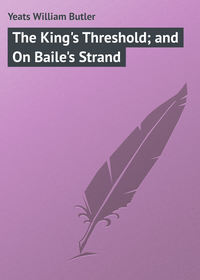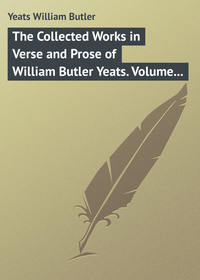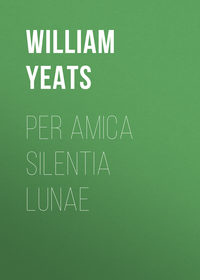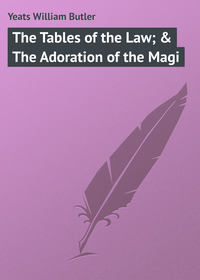 полная версия
полная версияThe Trembling of the Veil
I found her almost always full of gaiety that, unlike the occasional joking of those about her, was illogical and incalculable and yet always kindly and tolerant. I had called one evening to find her absent but expected every moment. She had been somewhere at the seaside for her health and arrived with a little suite of followers. She sat down at once in her big chair, and began unfolding a brown paper parcel while all looked on full of curiosity. It contained a large family Bible. “This is a present for my maid,” she said. “What a Bible and not even annotated!” said some shocked voice. “Well, my children,” was the answer, “what is the good of giving lemons to those who want oranges?” When I first began to frequent her house, as I soon did very constantly, I noticed a handsome clever woman of the world there, who seemed certainly very much out of place, penitent though she thought herself. Presently there was much scandal and gossip for the penitent was plainly entangled with two young men, who were expected to grow into ascetic sages. The scandal was so great that Madame Blavatsky had to call the penitent before her and to speak after this fashion, “We think that it is necessary to crush the animal nature; you should live in chastity in act and thought. Initiation is granted only to those who are entirely chaste,” and so it ran on for some time. However, after some minutes in that vehement style, the penitent standing crushed and shamed before her, she had wound up, “I cannot permit you more than one.” She was quite sincere but thought that nothing mattered but what happened in the mind, and that if we could not master the mind our actions were of little importance. One young man filled her with exasperation for she thought that his settled gloom came from his chastity. I had known him in Dublin where he had been accustomed to interrupt long periods of asceticism, in which he would eat vegetables and drink water, with brief outbreaks of what he considered the devil. After an outbreak he would for a few hours dazzle the imagination of the members of the local theosophical society with poetical rhapsodies about harlots and street lamps, and then sink into weeks of melancholy. A fellow-theosophist once found him hanging from the windowpole, but cut him down in the nick of time. I said to the man who cut him down, “What did you say to each other?” He said, “We spent the night telling comic stories and laughing a great deal.” This man, torn between sensuality and visionary ambition, was now the most devout of all, and told me that in the middle of the night he could often hear the ringing of the little “astral bell” whereby Madame Blavatsky’s master called her attention, and that, although it was a silvery low tone, it made the whole house shake. Another night I found him waiting in the hall to show in those who had right of entrance, on some night when the discussion was private, and as I passed he whispered into my ear, “Madame Blavatsky is perhaps not a real woman at all. They say that her dead body was found many years ago upon some Russian battlefield.” She had two dominant moods, both of extreme activity, one calm and philosophic, and this was the mood always on that night in the week when she answered questions upon her system, and as I look back after thirty years I often ask myself, “Was her speech automatic? Was she a trance medium, or in some similar state, one night in every week?” In the other mood she was full of fantasy and inconsequent raillery. “That is the Greek Church, a triangle like all true religion,” I recall her saying, as she chalked out a triangle on the green baize, and then as she made it disappear in meaningless scribbles, “it spread out and became a bramble bush like the Church of Rome.” Then rubbing it all out except one straight line, “Now they have lopped off the branches and turned it into a broomstick and that is protestantism.” And so it was night after night always varied and unforeseen. I have observed a like sudden extreme change in others, half whose thought was supernatural and Lawrence Oliphant records somewhere or other like observations. I can remember only once finding her in a mood of reverie, something had happened to damp her spirits, some attack upon her movement, or upon herself. She spoke of Balzac, whom she had seen but once, of Alfred de Musset, whom she had known well enough to dislike for his morbidity, and George Sand, whom she had known so well that they had dabbled in magic together of which “neither knew anything at all” in those days; and she ran on, as if there was nobody there to overhear her, “I used to wonder at and pity the people who sell their souls to the devil, but now I only pity them. They do it to have somebody on their side,” and added to that, after some words I have forgotten, “I write, write, write as the Wandering Jew walks, walks, walks.”
Besides the devotees, who came to listen and to turn every doctrine into a new sanction for the puritanical convictions of their Victorian childhood, cranks came from half Europe and from all America, and they came that they might talk. One American said to me, “She has become the most famous woman in the world by sitting in a big chair and permitting us to talk.” They talked and she played patience, and totted up her score on the green baize, and generally seemed to listen, but sometimes she would listen no more. There was a woman who talked perpetually of “the divine spark” within her, until Madame Blavatsky stopped her with – “Yes, my dear, you have a divine spark within you and if you are not very careful you will hear it snore.” A certain Salvation Army captain probably pleased her, for if vociferous and loud of voice, he had much animation. He had known hardship and spoke of his visions while starving in the streets and he was still perhaps a little light in the head. I wondered what he could preach to ignorant men, his head ablaze with wild mysticism, till I met a man who had heard him talking near Covent Garden to some crowd in the street. “My friends,” he was saying, “you have the kingdom of heaven within you and it would take a pretty big pill to get that out.”
Meanwhile I had got no nearer to proving that the sage Ahasuerus “dwells in a sea cavern ’mid the Demonesi,” nor did I learn any more of those “Masters” whose representative Madame Blavatsky claimed to be. All there seemed to feel their presence, and all spoke of them as if they were more important than any visible inhabitant of the house. When Madame Blavatsky was more silent, less vivid than usual, it was “because her Masters were angry;” they had rebuked her because of some error, and she professed constant error. Once I seemed in their presence, or that of some messenger of theirs. It was about nine at night, and half a dozen of us sat round her big table cloth, when the room seemed to fill with the odour of incense. Somebody came from upstairs, but could smell nothing – had been outside the influence it seems – but to myself and the others, it was very strong. Madame Blavatsky said it was a common Indian incense, and that some pupil of her master’s was present; she seemed anxious to make light of the matter and turned the conversation to something else. Certainly it was a romantic house, and I did not separate myself from it by my own will. I had learned from Blake to hate all abstraction, and, affected by the abstraction of what were called “esoteric teachings,” I began a series of experiments. Some book or magazine published by the society had quoted from that essay of magic, which Sibley, the eighteenth century astrologer, had bound up with his big book upon astrology. If you burnt a flower to ashes and put the ashes under, I think, the receiver of an air pump, and stood the receiver in the moonlight for so many nights, the ghost of the flower would appear hovering over its ashes. I got together a committee which performed this experiment without results. The “esoteric teachings” had declared that a certain very pure kind of indigo was the symbol of one of the seven principles into which they divided human nature. I got with some difficulty a little of this pure indigo, and gave portions of it to members of the committee, and asked them to put it under their pillows at night and record their dreams. I argued that all natural scenery must be divided into seven types according to these principles, and by their study we could rid the mind of abstraction. Presently a secretary, a friendly, intelligent man, asked me to come and see him, and, when I did, complained that I was causing discussion and disturbance. A certain fanatical hungry face had been noticed red and tearful, and it was quite plain that I was not in agreement with their methods or their philosophy. “We have certain definite ideas,” he said, “and we have but one duty, to spread them through the world. I know that all these people become dogmatic, that they believe what they can never prove, that their withdrawal from family life is for them a great misfortune, but what are we to do? We have been told that all spiritual influx into the society will come to an end in 1897 for exactly one hundred years; before that date our fundamental ideas must be spread in all countries.” I knew the doctrine, and it made me wonder why that old woman, or the “masters” from whom, whatever they were or were not, her genius had come, insisted upon it; for influx of some kind there must always be. Did they dread heresy, or had they no purpose but the greatest possible immediate effect?
XX
At the British Museum reading room I often saw a man of thirty-six, or thirty-seven, in a brown velveteen coat, with a gaunt resolute face, and an athletic body, who seemed before I heard his name, or knew the nature of his studies, a figure of romance. Presently I was introduced, where or by what man or woman I do not remember. He was called Liddle Mathers, but would soon, under the touch of “The Celtic Movement,” become Macgregor Mathers, and then plain Macgregor. He was the author of The Kabbala Unveiled, and his studies were two only – magic and the theory of war, for he believed himself a born commander and all but equal in wisdom and in power to that old Jew. He had copied many manuscripts on magic ceremonial and doctrine in the British Museum, and was to copy many more in Continental libraries, and it was through him mainly that I began certain studies and experiences, that were to convince me that images well up before the mind’s eye from a deeper source than conscious or subconscious memory. I believe that his mind in those early days did not belie his face and body, though in later years it became unhinged, for he kept a proud head amid great poverty. One that boxed with him nightly has told me that for many weeks he could knock him down, though Mathers was the stronger man, and only knew long after that during those weeks Mathers starved. With him I met an old white-haired Oxfordshire clergyman, the most panic-stricken person I have ever known, though Mathers’ introduction had been “he unites us to the great adepts of antiquity.” This old man took me aside that he might say – “I hope you never invoke spirits – that is a very dangerous thing to do. I am told that even the planetary spirits turn upon us in the end.” I said, “Have you ever seen an apparition?” “O yes, once,” he said. “I have my alchemical laboratory in a cellar under my house where the Bishop cannot see it. One day I was walking up and down there when I heard another footstep walking up and down beside me. I turned and saw a girl I had been in love with when I was a young man, but she died long ago. She wanted me to kiss her. O no, I would not do that.” “Why not?” I said. “O she might have got power over me.” “Has your alchemical research had any success?” I said. “Yes, I once made the elixir of life. A French alchemist said it had the right smell and the right colour” (the alchemist may have been Eliphas Levi, who visited England in the ’sixties, and would have said anything) “but the first effect of the elixir is that your nails fall out and your hair falls off. I was afraid that I might have made a mistake and that nothing else might happen, so I put it away on a shelf. I meant to drink it when I was an old man, but when I got it down the other day it had all dried up.”
Soon after my first meeting with Mathers he emerged into brief prosperity, becoming for two or three years Curator of a private museum at Forest Hill, and marrying a young and beautiful wife, the sister of the philosopher, Henri Bergson. His house at Forest Hill was soon a romantic place to a little group, Florence Farr, myself, and some dozen fellow students. I think that it was she, her curiosity being insatiable, who first brought news of that house and that she brought it in mockery and in wonder. Mathers had taken her for a walk through a field of sheep and had said, “Look at the sheep. I am going to imagine myself a ram,” and at once all the sheep ran after him; another day he had tried to quell a thunder storm by making symbols in the air with a masonic sword, but the storm had not been quelled; and then came the crowning wonder. He had given her a piece of cardboard on which was a coloured geometrical symbol and had told her to hold it to her forehead and she had found herself walking upon a cliff above the sea, seagulls shrieking overhead. I did not think the ram story impossible, and even tried half a dozen times to excite a cat by imagining a mouse in front of its nose, but still some chance movement of the flock might have deceived her. But what could have deceived her in that final marvel? Then another brought a like report, and presently my own turn came. He gave me a cardboard symbol and I closed my eyes. Sight came slowly, there was not that sudden miracle as if the darkness had been cut with a knife, for that miracle is mostly a woman’s privilege, but there rose before me mental images that I could not control: a desert and black Titan raising himself up by his two hands from the middle of a heap of ancient ruins. Mathers explained that I had seen a being of the order of Salamanders because he had shown me their symbol, but it was not necessary even to show the symbol, it would have been sufficient that he imagined it. I had already written in my diary, under some date in 1887, that Madame Blavatsky’s Masters were “trance personalities,” and I must have meant such beings as my black Titan, only more lasting and more powerful. I had found when a boy in Dublin on a table in the Royal Irish Academy a pamphlet on Japanese art and read there of an animal painter so remarkable that horses he had painted upon a Temple wall, had slipped down after dark and trampled the neighbours’ fields of rice. Somebody had come into the temple in the early morning, had been startled by a shower of water drops, had looked up and seen painted horses still wet from the dew-covered fields, but now “trembling into stillness.”
I had soon mastered Mathers’ symbolic system, and discovered that for a considerable minority – whom I could select by certain unanalysable characteristics – the visible world would completely vanish, and that world, summoned by the symbol, take its place. One day when alone in a third-class carriage, in the very middle of the railway bridge that crosses the Thames near Victoria, I smelt incense. I was on my way to Forest Hill; might it not come from some spirit Mathers had called up? I had wondered when I smelt it at Madame Blavatsky’s – if there might be some contrivance, some secret censer, but that explanation was no longer possible. I believed that Salamander of his but an image, and presently I found analogies between smell and image. It must be from thought but what certainty had I, that what had taken me by surprise, could be from my own thought, and if a thought could affect the sense of smell, why not the sense of touch? Then I discovered among that group of students that surrounded Macgregor, a man who had fought a cat in his dreams and awaked to find his breast covered with scratches. Was there an impassable barrier between those scratches and the trampled fields of rice? It would seem so, and yet all was uncertainty. What fixed law would our experiments leave to our imagination?
Mathers had learning but no scholarship, much imagination and imperfect taste, but if he made some absurd statement, some incredible claim, some hackneyed joke, we would half consciously change claim, statement or joke, as though he were a figure in a play of our composition. He was a necessary extravagance, and he had carried further than anyone else, a claim implicit in the romantic movement from the time of Shelley and of Goethe; and in body and in voice at least he was perfect; so might Faust have looked at the end of his hundred years. In the credulity of our youth we secretly wondered if he had not met with, perhaps even been taught by some old man who had found the elixir. Nor did he undeceive us. “If you find the elixir,” he was accustomed to say, “you always look a few years younger than the age at which you found it. If you find it at sixty you will look fifty for a hundred years.” None of us would have admitted that we believed in stone or elixir, the old Oxfordshire clergyman excited no belief, yet one among us certainly laboured with crucible or athanor. Ten years ago I called upon an elderly solicitor, on some business, but at his private house, and I remembered whose pupil he had been when I found among the ashes of the hearth a little earthen pot. He pretended that he studied alchemy that he might some day write its history, and I found when I questioned others, that for twenty years there had been just such a little pot among the ashes.
XXI
I generalized a great deal and was ashamed of it. I thought it was my business in life to be an artist and a poet, and that there could be no business comparable to that. I refused to read books and even to meet people who excited me to generalization, all to no purpose. I said my prayers much as in childhood, though without the old regularity of hour and place, and I began to pray that my imagination might somehow be rescued from abstraction and became as preoccupied with life as had been the imagination of Chaucer. For ten or twelve years more I suffered continual remorse, and only became content when my abstractions had composed themselves into picture and dramatization. My very remorse helped to spoil my early poetry, giving it an element of sentimentality through my refusal to permit it any share of an intellect which I considered impure. Even in practical life I only very gradually began to use generalizations, that have since become the foundation of all I have done, or shall do, in Ireland. For all I know all men may have been so timid, for I am persuaded that our intellects at twenty contain all the truths we shall ever find, but as yet we do not know truths that belong to us from opinions, caught up in casual irritation or momentary fantasy. As life goes on we discover that certain thoughts sustain us in defeat, or give us victory, whether over ourselves or others, and it is these thoughts, tested by passion, that we call convictions. Among subjective men (in all those, that is, who must spin a web out of their own bowels) the victory is an intellectual daily recreation of all that exterior fate snatches away, and so that fate’s antithesis; while what I have called “the Mask” is an emotional antithesis to all that comes out of their internal nature. We begin to live when we have conceived life as tragedy.
XXII
A conviction that the world was now but a bundle of fragments possessed me without ceasing. I had tried this conviction on the Rhymers, thereby plunging into greater silence an already too silent evening. “Johnson,” I was accustomed to say, “you are the only man I know whose silence has beak and claw.” I had lectured on it to some London Irish society, and I was to lecture upon it later on in Dublin, but I never found but one interested man, an official of the Primrose League, who was also an active member of the Fenian Brotherhood. “I am an extreme conservative apart from Ireland,” I have heard him explain; and I have no doubt that personal experience made him share the sight of any eye that saw the world in fragments. I had been put into a rage by the followers of Huxley, Tyndall, Carolus Duran, and Bastien-Lepage, who not only asserted the unimportance of subject whether in art or literature, but the independence of the arts from one another. Upon the other hand, I delighted in every age where poet and artist confined themselves gladly to some inherited subject matter known to the whole people, for I thought that in man and race alike there is something called “Unity of Being,” using that term as Dante used it when he compared beauty in the Convito to a perfectly proportioned human body. My father, from whom I had learned the term, preferred a comparison to a musical instrument so strung that if we touch a string all the strings murmur faintly. There is not more desire, he had said, in lust than in true love, but in true love desire awakens pity, hope, affection, admiration, and, given appropriate circumstance, every emotion possible to man. When I began, however, to apply this thought to the state and to argue for a law-made balance among trades and occupations my father displayed at once the violent free trader and propagandist of liberty. I thought that the enemy of this unity was abstraction, meaning by abstraction not the distinction but the isolation of occupation, or class or faculty —
“Call down the hawk from the airLet him be hooded, or caged,Till the yellow eye has grown mild,For larder and spit are bare,The old cook enraged,The scullion gone wild.”I knew no mediaeval cathedral, and Westminster, being a part of abhorred London, did not interest me, but I thought constantly of Homer and Dante, and the tombs of Mausolus and Artemisia, the great figures of King and Queen and the lesser figures of Greek and Amazon, Centaur and Greek. I thought that all art should be a Centaur finding in the popular lore its back and its strong legs. I got great pleasure too from remembering that Homer was sung, and from that tale of Dante hearing a common man sing some stanza from The Divine Comedy, and from Don Quixote’s meeting with some common man that sang Ariosto. Morris had never seemed to care greatly for any poet later than Chaucer and though I preferred Shakespeare to Chaucer I begrudged my own preference. Had not Europe shared one mind and heart, until both mind and heart began to break into fragments a little before Shakespeare’s birth? Music and verse began to fall apart when Chaucer robbed verse of its speed that he might give it greater meditation, though for another generation or so minstrels were to sing his lengthy elaborated Troilus and Criseyde; painting parted from religion in the later Renaissance that it might study effects of tangibility undisturbed; while, that it might characterize, where it had once personified, it renounced, in our own age, all that inherited subject matter which we have named poetry. Presently I was indeed to number character itself among the abstractions, encouraged by Congreve’s saying that “passions are too powerful in the fair sex to let humour,” or as we say character, “have its course.” Nor have we fared better under the common daylight, for pure reason has notoriously made but light of practical reason, and has been made light of in its turn from that morning when Descartes discovered that he could think better in his bed than out of it; nor needed I original thought to discover, being so late of the school of Morris, that machinery had not separated from handicraft wholly for the world’s good, nor to notice that the distinction of classes had become their isolation. If the London merchants of our day competed together in writing lyrics they would not, like the Tudor merchants, dance in the open street before the house of the victor; nor do the great ladies of London finish their balls on the pavement before their doors as did the great Venetian ladies, even in the eighteenth century, conscious of an all enfolding sympathy. Doubtless because fragments broke into ever smaller fragments we saw one another in a light of bitter comedy, and in the arts, where now one technical element reigned and now another, generation hated generation, and accomplished beauty was snatched away when it had most engaged our affections. One thing I did not foresee, not having the courage of my own thought: the growing murderousness of the world.
“Turning and turning in the widening gyreThe falcon cannot hear the falconer;Things fall apart; the centre cannot hold;Mere anarchy is loosed upon the world,The blood-dimmed tide is loosed and everywhereThe ceremony of innocence is drowned;The best lack all conviction while the worstAre full of passionate intensity.”








